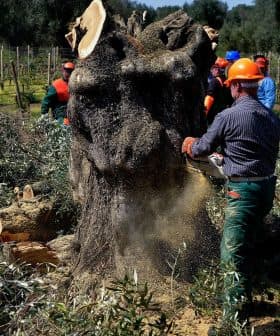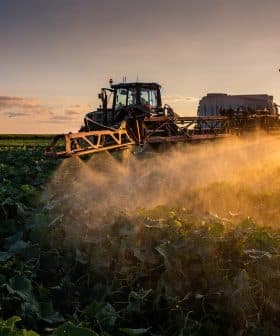Yale to Host Conference on Olive Oil, Plans to Establish Research Center
The conference will gather industry members from an array of disciplines to plan the formation of an olive oil think tank.
 Yale University
Yale UniversityYale University’s School of Public Health is organizing its first conference on olive oil, which will cover topics such as olive oil chemistry, health, climate change impacts, and innovation in the sector. The event, inspired by Tassos Kyriakides’ participation in an olive oil certification program, aims to eventually establish a center at Yale dedicated to olive oil knowledge and studies. The conference, to be held on October 3 and 4, will bring together academics, industry professionals, and trade groups to discuss the future of the olive oil industry.
Yale University’s School of Public Health is set to host its first conference on olive oil next month.
The two-day event will bring together people from diverse disciplines to discuss a variety of topics including olive oil chemistry and health, testing methods, the impacts of climate change and disease on its cultivation, as well as the potential for innovation in the sector.
Tassos Kyriakides said he came up with the idea for the conference after completing the Olive Oil Sommelier Certification Program at the International Culinary Center, which is produced by the Olive Oil Times Education Lab.
Kyriakides and the department chair at Yale’s School of Public Health, Vasilis Vasiliou, envision the conference as an annual event leading eventually to the formation of a center at Yale dedicated to aggregating and disseminating olive oil knowledge as well as supporting projects and studies.
“I knew something had to come together from [my participation in the course],” Kyriakides told Olive Oil Times. “What I think drove the idea for this center in my mind was that there is all this information out there from all these people and their perspectives working on these things.”
Among those attending the conference will be academics, industry professionals and trade groups from Greece, Italy, Spain and the United States. Kyriakides is expecting between 80 and 100 people to attend. He said that the responses from those invited to attend have been overwhelmingly positive.
“There are a lot of different people coming from their own perspective and the idea is that a center, such as this one, will function as a facilitator of activities that happen all over the world,” he said.
“We feel that everybody will benefit from something like that,” he said. “We see this as an attempt for individuals to contribute and give back to other centers and organizations based on what they do in their area.”
How exactly the center will work is yet to be determined. Kyriakides plans on letting the two-day conference run its course and taking into account what everyone in attendance thinks before charting a path forward.
The first day of the conference will be dedicated to presentations from a diverse array of individuals and fields, each discussing what they are doing in the olive oil sector. The second day will be more of an open dialogue with people breaking off into smaller groups. At the end of the day, everyone will get back together and share what they discussed.
“At the end, we will re-envision the output of this and draft guidelines or a blueprint of how this center will work,” Kyriakides said, adding that he already has the backing of the dean of the School of Public Health.
Joseph R Profaci, the executive director of the North American Olive Oil Association (NAOOA), said he will be among the industry trade group representatives attending the conference.
Profaci told Olive Oil Times that the NAOOA has been looking for an academic partner with which to establish a multi-disciplinary olive oil center focussing on health and nutrition. The trade group had approached several other universities with the proposal but were pleasantly surprised to hear this news coming out of Yale.
“I was very excited to see this idea spring from Kyriakides and Vasiliou, apparently without prompting from the industry,” Profaci said. “Clearly, the key challenge for the proposed Yale center, or any such center, will be finding substantial and sustainable sources of funding.”
However, Kyriakides does not seem worried about funding the project.
“Starting something like this, our idea is to draw support from foundations and agencies that will support projects geared toward the study of olive oil and any area of focus,” he said. “[This will] allow individuals and organizations to be able to apply for some funding, some resources so they can continue doing their work.”
If it were only up to Kyriakides, the center would primarily focus on public health and nutrition, which is what got him involved with olive oil and the Mediterranean diet in the first place. He sees American consumers as undereducated about the health benefits of olive oil and believes this center could be one step in helping to change that.
“I think with my own bias being in public health and nutrition, [we should focus on] how we maximize the ability of this product,” he said. “In the U.S. we are behind in the education and acknowledgment that this is a product that should be used, not just for the culinary qualities that it has, but also for the health benefits that it has.”
“Having a center that will gather and disseminate that information at an academic institution such as an Ivy League school definitely helps promote that idea and give it weight,” he added.
The olive oil and health conference will be held on October 3 and 4 at the Yale School of Public Health in New Haven, Connecticut.









